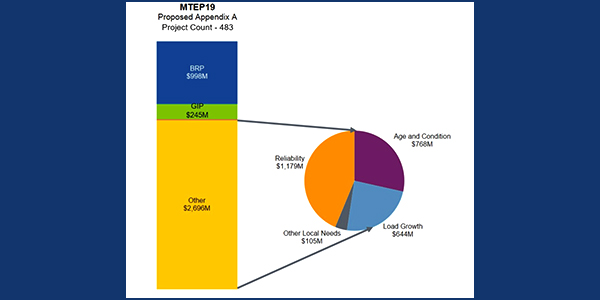By Amanda Durish Cook
MISO is poised to recommend nearly $4 billion in spending in its 2019 Transmission Expansion Plan (MTEP), making it the second costliest such package in the RTO’s history.
The draft MTEP 19 was brought into focus over a final series of subregional planning meetings last week. The transmission projects in the bundle so far number 483 at a total cost of $3.95 billion, with MISO South’s 72 proposed projects accounting for $760 million. The priciest projects are clustered in southern Illinois, southern Michigan and southern Louisiana.
MISO will post a final draft on Sept. 16, a day before putting the plan before the System Planning Committee of the Board of Directors at its meeting in St. Paul, Minn.
Last month, MISO was positioned to recommend 529 new projects at $4.4 billion. Even with the loss of about four dozen projects, the latest MTEP is positioned to be second most expensive behind the 2011 package that contained the multi-value project portfolio. Last year, MTEP 18 rang in at $3.4 billion and 442 projects. (See MTEP 19 Revealing High Price Tag.)
During an East subregional planning meeting Wednesday, Thompson Adu, MISO senior manager of transmission expansion planning, advised stakeholders that the cost and project figures are still subject to change, but he said the numbers are “almost finalized.”
MTEP 19 contains new breakdowns in MISO’s “other project” category to capture the specific drivers of projects. This year’s $2.7 billion “other” category is now broken down into about $1.2 billion in reliability projects, $768 million in age- and condition-based projects, $644 million in load growth projects and $105 million worth of other local needs. Baseline reliability projects account for almost $1 billion in spending, while generator interconnection projects make up $245 million. MISO said the majority of MTEP 19 projects are expected to be in service within five years.
Director of Planning Jeff Webb said MISO had been mulling creating an MTEP project classification for age- and condition-based upgrades to avoid having so many projects simply labeled as “other.”
Webb said the number of MTEP projects falling into the “other” category is a “carried-over legacy” from when the RTO had to separate regional reliability projects from local reliability projects for cost allocation purposes.
“Every time we take the [project] bar charts to the board, it’s mostly ‘other.’ … We’re thinking of changing that. We’re tired of having to explain exactly what ‘other’ is over and over,” Webb said during a June planning meeting.
During an Aug. 23 West subregional planning meeting, stakeholders criticized MISO for modeling too few future wind resources in congestion relief planning. Multiple staff members pointed to the planned overhaul of futures in time for the 2021 transmission planning schedule. But some stakeholders said MISO was planning for less wind for 2030 than would be actually installed in 2020.
“I find myself wondering why we’re building futures with significant future generation and don’t include the likely associated interconnection upgrades,” WPPI Energy’s Steve Leovy said.
Some stakeholders at the meetings also said the MTEP timeline is challenging, only allowing for stakeholders to suggest alternative projects in June and July.
1 Possible Project from MCPS
Stakeholders last week also learned that few proposals were able to demonstrate enough benefits to pass the first round of scrutiny in this year’s Market Congestion Planning Study (MCPS), designed to identify congestion-relieving projects.
Among the proposals, MISO will only take a deeper look at two possible solutions to resolve the congested Bosserman-Trail Creek 138-kV line in northern Indiana. Both projects are also under consideration as part of the MISO-PJM Coordinated System Plan, and the RTOs will make a recommendation at the Sept. 20 Interregional Planning Stakeholder Advisory Committee meeting if they plan to pursue one of the two.
MISO has until Sept. 23 to file another cost allocation plan with MISO Mulling Next Steps on Cost Allocation Overhaul.) MISO staff said they hope to have a revised interregional cost allocation structure in place before project approvals in December.
MISO planning staffer David Severson said no projects in the RTO’s North region or along the SPP seam met requirements in the MCPS. Project candidates to address congestion on the Helena-to-Scott County 345-kV line in southern Minnesota did not pass a robustness analysis, MISO said. The $32 million line was one of eight initially promising projects to come from the MCPS. (See “8-Project Draft from Congestion Study,” MISO Studying Projects to Cut North-South Tx Reliance.)
This year’s MCPS included the MISO-MISO, SPP Empty-handed After 3rd Project Study.)
Last week’s planning meetings did not address the ongoing analysis into a possible project to ease traffic on the North-South transmission constraint. That effort is being conducted separately from the MCPS and will continue beyond the MTEP 19 approval deadline in December. MISO staff earlier this year said they weren’t bound to an MTEP 19 deadline to submit any project recommendations and could take more time to conduct thorough testing of candidates.






